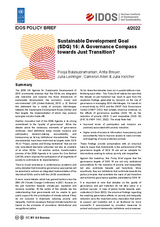Policy Brief
Sustainable Development Goals (SDG) 16: a governance compass towards just transition?
Balasubramanian, Pooja / Anita Breuer / Julia Leininger / Cameron Allen / Julia KercherPolicy Brief (4/2022)
Bonn: German Institute of Development and Sustainability (IDOS)
DOI: https://doi.org/10.23661/ipb4.2022
The 2030 UN Agenda for Sustainable Development of 2015 prominently stresses that “the SDGs are integrated and indivisible and balance the three dimensions of sustainable development: the economic, social and environmental” (UN [United Nations], 2015, p. 3). Behind this statement lies a reality of complex interlinkages between the Sustainable Development Goals (SDGs) and their targets, the implementation of which may produce synergies but also trade-offs. Another innovative trait of the 2030 Agenda is its strong commitment to the “quality of governance”. While the debate about the necessary elements of governance continues, most definitions today include inclusive and participatory decision-making, accountability, and transparency as its key institutional characteristics. These characteristics have been enshrined as targets under SDG 16 on “Peace, Justice and Strong Institutions” that are not only considered desirable outcomes but also as enablers of all other SDGs. Yet another central, transformative promise of the 2030 Agenda is to Leave No One Behind (LNOB), which requires the participation of all segments of society to contribute to its implementation. There is broad consensus in contemporary academic and policy debates that innovative governance approaches will be essential to achieve an integrated implementation of the interlinked SDGs and to fulfil the LNOB commitment. A more recent debate, which has gained traction since the 26th UN Climate Change Conference in 2021, focuses on the just transition towards climate-just, equitable and inclusive societies. At the centre of this debate lies the understanding that governments will be unable to gain public support for the prioritisation of climate actions if they do not succeed in drastically reducing poverty and inequality. It will be necessary that just climate transition be based on the principles of procedural, distributional and recognitional justice.
So far, these two debates have run in parallel without cross-fertilising each other. This Policy Brief makes the case that the debate on just transition has much to gain from the academic findings generated by research on the role of governance in managing SDG interlinkages. It is based on a recent study by IDOS and the UNDP Oslo Governance Centre (UNDP OGC) that collates empirical evidence on the effects of governance qualities (SDG 16) on the reduction of poverty (SDG 1) and inequalities (SDG 10) (DIE* & UNDP OGC, 2022). The study finds that:
• Improved levels of participation and inclusion are positively associated with poverty reduction;
• Higher levels of access to information, transparency and accountability help to improve access to basic services and targeting of social protection policies.
These findings provide policymakers with an empirical basis to argue that investments in the achievement of the governance targets of SDG 16 can act as catalysts for interventions seeking to reduce poverty and inequalities.
Against this backdrop, this Policy Brief argues that the governance targets of SDG 16 are not only institutional preconditions for the reduction of poverty and inequalities but also contribute towards just transitions. More specifically: they are institutions that contribute towards the justice principles that constitute the basis of just transition and exhibit the governance qualities postulated by SDG 16. It is important to note that debates on the quality of governance and just transition do not take place in a political vacuum. In view of global trends towards auto-cratisation (V-Dem 2022), the empirical findings regarding the enabling governance effects on poverty and inequality reduction carry the important policy implication that action to support just transition will in all likelihood be more successful if accompanied by proactive measures to protect and support democratic institutions and processes.
Contact
Cornelia Hornschild
Publication Coordinator
E-mail Cornelia.Hornschild@idos-research.de
Phone +49 (0)228 94927-135
Fax +49 (0)228 94927-130
Alexandra Fante
Librarian/ Open Access Coordinator
E-Mail Alexandra.Fante@idos-research.de
Telefon +49 (0)228 94927-321
Fax +49 (0)228 94927-130





![[Translate to English:] Photo: Alexandra Fante, Bibliothekarin/Open Access-Koordinatorin](/fileadmin/_processed_/f/0/csm__c_Deutsches-Institut-fuer-Entwicklungspolitik_Fante_94ce4fa1ba.jpg)